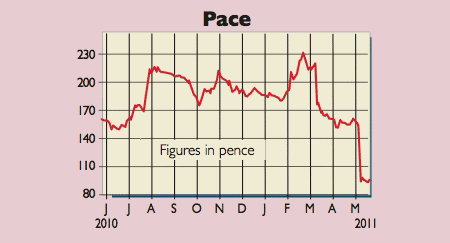
One thing that’s not about to vanish, whatever the state of the economy, is the internet. With the exception of Facebook, many internet stocks are very cheap.
1. Pace (LSE: PIC), rated a BUY by JP Morgan
Take Pace, the world’s biggest maker of set-top boxes (STB), with around 160 customers, including Comcast and AT&T. It shipped 20.8 million units in 2010 and grew like-for-like revenues 9.7%. Yet the shares have halved since February on the back of two profit warnings. The first was triggered by a large US order being deferred and the second by lower margins in Europe and component shortages due to Japan’s nuclear disaster. So $50m has been sliced off the full-year operating profit target, which is now in the $150m-$170m range.
Yet the fundamentals are still intact. According to ABI Research, global online traffic is projected to soar 750% over the next five years – equivalent to an annual growth rate of 50%. That’s due mainly to the popularity of using the web to watch videos and television.
One big challenge is how to handle this vast amount of complex data when it arrives at the doorstep. These files are broadcast in either standard, high definition (HD) or 3D formats from satellites such as Sky via cables (ie, Virgin), over the internet by way of providers such as BT Vision or, increasingly, a mixture of all three. Being able to process, archive and play this content in the blink of an eye requires the type of cutting-edge technology offered by Pace. Indeed, its $6.9bn STB market should expand at a 7% clip in 2011, driven by strong HD TV sales and the switchover from analogue to digital technology in Europe and America.
Moreover, if the economic backdrop does soften, staying in could become the new going out as cash-strapped consumers opt for high-quality home entertainment rather than splashing out at the cinema.
Pace’s $475m acquisition of California-based 2Wire in October also looks smart. This now allows it to produce devices that serve as a broadband router as well as a traditional STB. “What we will be able to do is unique,” says CEO Neil Gaydon. “No other set-top box provider can supply all three transmission systems of cable, satellite and telecommunications.”
Assuming he’s right, the firm’s recent hiccups should be temporary, with margins set to rebound in the second half to 8% (versus 5.5% in the first half). So the City is forecasting 2011 turnover and underlying earnings per share (EPS) of £1.5bn and 22.6p respectively, rising to £1.6bn and 27.7p by 2012. The stock trades on a derisory p/e ratio of 4.8 as a result, which seems way too cheap. I’d rate it on an eight-times earnings before interest, tax and amortisation (EBITA) multiple. After deducting net debt of £200m, that delivers an intrinsic worth of 185p per share .
So what could go wrong? The second-half recovery could splutter if there is a double-dip or there are problems integrating 2Wire. Pace is also exposed to the dangers of technological obsolescence, price devaluation and foreign-exchange fluctuations. That said, the directors have recently snapped up stakes at prices ranging from 96p to 186p. JP Morgan has a target price of 180p, with interims due in late July.
Recommendation: BUY at 109p
Betfair (LSE: BET), rated a BUY by Numis Securities
Another innovative web play is Betfair, which pioneered the concept of betting exchanges on sports events. It’s the eBay of online gambling, allowing punters to set their own odds and wager against each other. The advantage of this is that spreads tend to be tighter – so you have a slightly greater chance of winning.
Betfair also provides a host of online casino and poker games, along with owning a joint venture in Australia and an exchange platform for financial spread-betters.
Yet its shares haven’t proved the success story investors had hoped for after its £13 a share flotation last year. At the interims in December, trading was disappointing and made worse by a string of horse-race meetings that were cancelled because of cold weather. But the biggest headache facing the business is the uncertainty surrounding regulation. Germany’s State Lottery Treaty has proposed a prohibitive 16.7% levy on revenues. If ratified that would effectively halt sports betting in Germany (which makes up 5% of Betfair’s sales).
Fears over similarly onerous actions look misplaced, though. Regulators risk pushing the public into the arms of unscrupulous operators who don’t pay tax anyway. So the sensible approach is to harmonise standards across Europe, say, by adopting Britain’s 15% gross profit tax, or even Gibraltar’s 1% duty.
Even America is beginning to see the light. Federal law-makers banned the industry in 2006, but new legislation is being passed on a state-by-state basis. In September, California legalised using betting exchanges for horse racing with effect from May 2012. New Jersey has followed suit. This is potentially a game-changer for Betfair’s existing American licensed operation. New technology is helping too. In H1 there was a 70% increase in sports revenues placed from mobile devices, such as iPhones.
Housebroker Numis is forecasting revenues and earnings before interest, tax, depreciation and amortisation (EBITDA) of £338m and £77m respectively for the year ending April. Those rise to £386m and £112m 12 months later. Using a ten-times forward multiple and adjusting for net cash of £178m, I get an intrinsic worth of more than £11.50 a share.
As for risks, the main one is that another recession would bring rising unemployment and lower consumer spending. All the same, with huge barriers to entry, a low-cost model and the added fillip of the 2012 Olympics, Betfair should coin it in for years.
Preliminary results are due in June. Numis has a price target of £16.
Recommendation: BUY at 753p